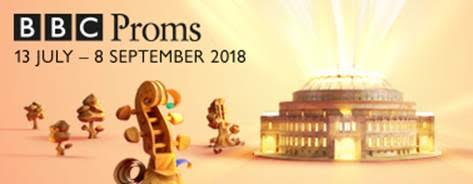
 United Kingdom BBC PROMS 21 – Mozart, Georg Friedrich Haas and R. Strauss: Hornroh Modern Alphorn Quartet, BBC Scottish Symphony Orchestra / Ilan Volkov (conductor), Royal Albert Hall, London, 30.7.2018. (AS)
United Kingdom BBC PROMS 21 – Mozart, Georg Friedrich Haas and R. Strauss: Hornroh Modern Alphorn Quartet, BBC Scottish Symphony Orchestra / Ilan Volkov (conductor), Royal Albert Hall, London, 30.7.2018. (AS)
Mozart – Notturno in D K.286
Georg Friedrich Haas – Concerto grosso No.1 for four alphorns and orchestra (UK premiere)
R. Strauss – Eine Alpensinfonie Op.64
A concert item listed as a concerto grosso for four alphorns and orchestra by a composer called Georg Friedrich Haas would seem at first glance probably to be an eccentric creation by some forgotten eighteenth-century Austrian composer. But no, the composer, though certainly Austrian, was born in 1953. Well, never mind, if four alphorns are involved it must still surely be an amusing, jokey sort of piece. Wrong again, since Haas’s work of this title, cast in one half-hour movement, is deadly serious. The composer, we were told by the programme note, suffered a “far from idyllic”, even “forbidding” early life in the mountainous Vorarlberg province of western Austria. And his music here at least certainly conveys a strong impression of pain and suffering. The composer himself tells us that the alphorns “are not seen as symbols of folklorist culture, but rather as the source of another dimension of intonation (overtone chords), used to create contrast and expand the traditional 12-note tuning of the symphony orchestra”. The horns are all of different length and are tuned naturally and differently, so when played in consort they generate microtone intervals. The orchestra is very much dominated, though it produces fluttery string effects here and chugging ensemble effects there of a kind that would not be out of place in a minimalist composition: generally, it merely provides a commentary on the contributions of the soloists. Though the horns are of course capable of producing melodies and tunes of a sort, for almost the whole of this work they are used to produce long, sustained chords. If it is Haas’s intention to discomfort his listeners he certainly succeeds, since the effect of loud, continuous chordal effects that have no normal tonal relationship is excruciating to the ear. The horns finally break into a series of creaky fanfares, representing victory over the orchestra.
The progamme’s opening work, Mozart’s Notturno in D was written for four orchestras, or rather for a primary ensemble with three other identical secondary groups, placed at various different points in the hall, successively echoing material played by the leading ensemble on the platform. The performance, which induced much head twisting and turning on the part of the audience as the echo effects came to them from different directions, was excellently and charmingly managed by Volkov and his expert teams. The Notturno is a perfect piece for the round shape and vast space of the Albert Hall, and it seems surprising that it has only ever been played at the Proms on four previous occasions.
The final work in the programme also has an offstage band, consisting of no less than 12 horns, two trumpets and two trombones: this group depicts the sounds of a hunting party for just a minute or two in the course of Strauss’s Alpine Symphony, and must be one of the most extravagant pieces of orchestral scoring by any great composer. Since Strauss also calls for a very large main orchestral body, it is not surprising that his work is very rarely heard live. Fortunately, there have been a few London performances of it in recent years since it represents Strauss in his ripest and most inspired vein. The feats of orchestration are quite amazing, the melodic material is gorgeous and in its depiction of such mountainous encounters for intrepid climbers as a waterfall, a glacier, views from the summit, a thunderstorm and sunset it has a strong dramatic content.
All this would go for nothing in a tame performance, but Volkov conducted with vigour and flair, conveying the contrasted nature of each episode very vividly. Never before have I heard the thematic relationships in the work brought out so clearly. The BBC Scottish Orchestra and guest additional players performed with great enthusiasm and skill under Volkov’s confident direction, and it was certainly a performance to cherish in the memory.
Alan Sanders

Thank you, Mr Sanders, for making me feel I might actually have had valid feelings about this concert. The critics who reviewed it in the broadsheets were nice enough about it but you pointed out some of the magic that I think they missed. Your review nailed it, in my view. Please keep enjoying these events, and posting reviews!
Thank you for your kind comments on Alan’s review and for (obviously) reading S&H. Yes where possible all our reviews are as honest and informed as they can be. Please tell your friends!